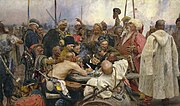| This article needs additional citations for verification. Please help improve this article by adding citations to reliable sources. Unsourced material may be challenged and removed. Find sources: "Cossack host" – news · newspapers · books · scholar · JSTOR (December 2023) (Learn how and when to remove this message) |
| Part of a series on |
| Cossacks |
|---|
 Reply of the Zaporozhian Cossacks Reply of the Zaporozhian Cossacks |
| Cossack hosts |
| Other Cossack groups |
| History |
| Notable Cossacks |
| Cossack terms |
| Cossack folklore |
|
A Cossack host (Ukrainian: козацьке військо, romanized: kozatske viisko; Russian: каза́чье во́йско, kazachye voysko), sometimes translated as Cossack army, was an administrative subdivision of Cossacks in the Russian Empire. Earlier the term viisko (host) referred to Cossack organizations in their historical territories, most notable being the Zaporozhian Host of Ukrainian Cossacks.
Russian Empire
Each Cossack host consisted of a certain territory with Cossack settlements that had to provide military regiments for service in the Imperial Russian Army and for border patrol operations. Usually the hosts were named after the regions of their location. The stanitsa, or village, formed the primary unit of this organization.
In the Russian Empire (1721-1917), the Cossacks constituted twelve separate hosts, settled along the frontiers:
- the Don Cossack Host
- the Bug Cossacks
- the Kuban Cossack Host
- the Terek Cossack Host
- the Astrakhan Cossack Host
- the Ural Cossack Host
- the Orenburg Cossack Host
- the Siberian Cossacks
- the Semiryechye Cossack Host
- the Transbaikal Cossack Host
- the Amur Cossack Host
- the Ussuri Cossack Host
There was also a small number of the Cossacks in Krasnoyarsk and Irkutsk, who would form the Yenisey Cossack Host and the Irkutsk Cossack Regiment of the Ministry of the Interior in 1917.
Cossack hosts on Russian soil were disbanded in 1920, in the course of the Russian Civil War of 1917–1922 in a deliberate process of De-Cossackization to remove their identity. Cossacks who settled abroad continued to preserve the traditions of their hosts of origin (for example: the Triunited Don-Kuban-Terek Cossack Union (Russian: Объединенный совет Дона, Кубани и Терека (ОСДКТ)) founded in Istanbul in January 1921).
List of hosts
- Amur Cossack Host (1854–)
- Astrakhan Cossack Host
- Azov Cossack Host (1832–1862)
- Baikal Cossack Host (1655-1920)
- Bashkir Host [ru] (1798-1865)
- Black Sea Cossack Host (1787–1864)
- Buh Cossack Host (1769–1817)
- Caucasus Line Cossack Host (1832–1860)
- Danube Cossack Host (1828–1868), an Imperial Russian Cossack Host formed from descendants of the Zaporozhian Cossacks
- Don Cossack Host (1570-)
- Greben Cossacks Host (1711-)
- Kuban Cossack Host (1860–1920)
- Orenburg Cossack Host (1755–1920)
- Semiryechye Cossack Host (1867–1920)
- Siberian Cossack Host (1582-1918)
- Terek Cossack Host (1577–)
- Transbaikal Cossack Host (1851–1920)
- Ural Cossack Host
- Ussuri Cossack Host (1889–1922)
- Volga Cossack Host (1734–1777)
- Zaporozhian Host (–1775) — the Ukrainian Cossacks who lived in Zaporizhia, in Central Ukraine during the 16th — 18th centuries.
See also
References
- "Kuban Cossack Host". Internet Encyclopedia Of Ukraine. Internet Encyclopedia Of Ukraine. Retrieved 26 December 2023.